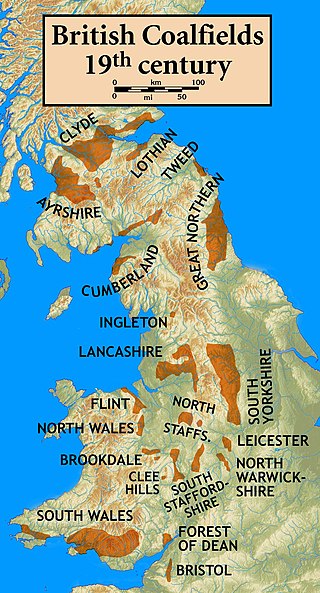
Farnworth is a town in the Metropolitan Borough of Bolton, Greater Manchester, England, 2 miles (3.2 km) southeast of Bolton, 4 miles south-west of Bury (7 km), and 8 miles (12.9 km) northwest of Manchester.
A mining accident is an accident that occurs during the process of mining minerals or metals. Thousands of miners die from mining accidents each year, especially from underground coal mining, although accidents also occur in hard rock mining. Coal mining is considered much more hazardous than hard rock mining due to flat-lying rock strata, generally incompetent rock, the presence of methane gas, and coal dust. Most of the deaths these days occur in developing countries, and rural parts of developed countries where safety measures are not practiced as fully. A mining disaster is an incident where there are five or more fatalities.

Westhoughton is a town and civil parish in the Metropolitan Borough of Bolton, Greater Manchester, England, 4 miles (6 km) southwest of Bolton, 5 miles (8 km) east of Wigan and 13 miles (21 km) northwest of Manchester.

Easington Colliery is a village in County Durham, England, known for a history of coal mining. It is situated to the north of Horden, a short distance to the east of Easington. It had a population of 4,959 in 2001, and 5,022 at the 2011 Census.

The Pretoria Pit disaster was a mining accident on 21 December 1910, when an underground explosion occurred at the Hulton Colliery Bank Pit No. 3, known as the Pretoria Pit, in Over Hulton, Westhoughton, then in the historic county of Lancashire, in North West England. A total of 344 men and boys lost their lives.
William Rimmer (1862–1936) was a Lancashire composer and conductor of brass band music who was particularly well known for his marches.

Wet Earth Colliery was a coal mine located on the Manchester Coalfield, in Clifton, Greater Manchester. The colliery site is now the location of Clifton Country Park. The colliery has a unique place in British coal mining history; apart from being one of the earliest pits in the country, it is the place where engineer James Brindley made water run uphill.
Wingates is a small settlement located in the town of Westhoughton, in the Metropolitan Borough of Bolton, Greater Manchester, England. The name is believed to mean 'a gate for the wind', and it seems likely as this is in an exposed position above Westhoughton. It has also been known as Win-yate and Windyates. Historically part of Lancashire, it lies mainly along the A6 road between Blackrod and Walkden.
Chasing Sheep is Best Left to Shepherds is a piece of minimalist music from the soundtrack for The Draughtsman's Contract, written by Michael Nyman. In the forty years since its release it has been much quoted and sampled and performed by various ensembles. It is based on the Prelude to Act III, Scene 2 of Henry Purcell’s opera, King Arthur.

Over Hulton is a suburb of Westhoughton within the Metropolitan Borough of Bolton, in Greater Manchester, England. Historically part of Lancashire, it lies 3.5 miles (5.6 km) south west of Bolton.

The Lancashire Coalfield in North West England was an important British coalfield. Its coal seams were formed from the vegetation of tropical swampy forests in the Carboniferous period over 300 million years ago.
Ramsden's Shakerley Collieries was a coal mining company operating the Nelson and Wellington Pits from the mid 19th century in Shakerley, Tyldesley in the historic county of Lancashire, England.
Chequerbent railway station was in Westhoughton to the south-west of Bolton, Greater Manchester, on a deviation of the original Bolton Great Moor St to Kenyon Junction line. The station replaced an earlier station on the original line of the railway that had been served by a stationary engine. It was open from 1885 until 1952 for passengers and 1965 for freight.
Hart Common is a village in Westhoughton, in the Metropolitan Borough of Bolton, Greater Manchester, England, lying mainly along the A58 road.

Bickershaw Colliery was a coal mine, located on Plank Lane in Leigh, then within the historic county boundaries of Lancashire, England.
New Lester Colliery was a coal mine operating on the Manchester Coalfield from the second half of the 19th century to the first half of the 20th century in Tyldesley, then in the historic county of Lancashire, England. It was owned by James Roscoe and two shafts were sunk in about 1865 on the east side of Mort Lane on the road to Little Hulton where Roscoe had sunk the Peel Hall and New Watergate pits.
The Hulton Colliery Company was a coal mining company operating on the Lancashire Coalfield from the mid 19th century in Over Hulton and Westhoughton, then in the historic county of Lancashire, England. The company had its origins in small coal mines on the northern part of the Hulton Park estate in 1571 owned by the Hultons who had held the estate from medieval times.

The Hulton family of Hulton lived and owned land in Lancashire for more than eight hundred years from the late-12th to the late-20th centuries. The family took its name from the three townships surrounding their Hulton Park Estate, Over, Middle and Little Hulton.

Westhoughton Town Hall is a municipal building in Market Street, Westhoughton, Greater Manchester, England. The town hall is the meeting place of Westhoughton Town Council.










